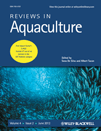
Reviews in Aquaculture
Scope & Guideline
Advancing Sustainable Solutions in Aquaculture
Introduction
Aims and Scopes
- Sustainability in Aquaculture:
Focusing on innovative practices and technologies, such as biofloc technology and circular bio-economy, to promote environmentally friendly aquaculture practices. - Health Management and Disease Control:
Exploring disease prevention strategies, including the use of probiotics and immunostimulants, as well as advancements in diagnostics for aquatic pathogens. - Nutrition and Feed Development:
Investigating nutritional requirements and feed formulations that enhance growth, health, and sustainability of aquaculture species, including alternative protein sources and functional feeds. - Genomics and Breeding Technologies:
Examining the application of genomic tools and gene editing technologies to improve disease resistance and productivity in aquaculture species. - Ecological and Environmental Interactions:
Analyzing the ecological impacts of aquaculture practices on marine and freshwater environments, including interactions between farmed and wild species. - Technological Innovations:
Highlighting the integration of emerging technologies, such as IoT and nanotechnology, in aquaculture practices to improve monitoring, efficiency, and sustainability.
Trending and Emerging
- Microbiome Research:
An increasing number of studies focus on the gut microbiome of aquatic species, aiming to understand its role in health and disease resistance, which is crucial for enhancing aquaculture efficiency. - Sustainable Feed Alternatives:
There is a growing emphasis on developing alternative protein sources, such as insect meals and plant-based ingredients, to reduce reliance on traditional fishmeal and improve sustainability in aquafeeds. - Climate Change Resilience:
Research addressing the impacts of climate change on aquaculture practices, including species adaptation and mitigation strategies, is gaining traction as the industry seeks to remain viable under changing environmental conditions. - Genetic Technologies:
The use of gene editing and genomic selection in aquaculture breeding is rapidly emerging, providing new avenues for enhancing productivity and disease resistance in various species. - Holistic Health Approaches:
A trend towards integrating health management practices that encompass nutrition, immunology, and welfare considerations is evident, fostering a more comprehensive understanding of aquaculture systems.
Declining or Waning
- Traditional Antibiotic Use:
There is a noticeable decline in research centered on conventional antibiotic treatments for aquaculture diseases as the industry shifts towards alternative methods and practices due to growing concerns over antimicrobial resistance. - Passive Aquaculture Practices:
Research on passive or traditional aquaculture practices is less frequently published, indicating a shift towards more innovative, technology-driven approaches that emphasize efficiency and sustainability. - Non-native Species Introduction:
The focus on non-native species for aquaculture has waned as concerns about ecological impacts and invasiveness have increased, leading to a more cautious approach in species selection. - Generic Species Research:
There is a trend away from generic studies on widely farmed species towards more specialized research on less common species and those with unique ecological or economic importance.
Similar Journals

Poultry Science Journal
Exploring the frontiers of animal science and food production.Poultry Science Journal, with the ISSN 2345-6604 and E-ISSN 2345-6566, is an esteemed publication spearheaded by Gorgan University of Agricultural Sciences & Natural Resources since its transition to Open Access in 2013. Based in Iran, this journal serves as a vital platform for disseminating cutting-edge research and innovative advancements in the fields of Animal Science and Food Animals. With a current impact reflected in its Q3 quartile ranking within its categories and Scopus ranks indicating a competitive standing among peers, the journal plays a crucial role in enhancing the academic discourse surrounding poultry science. Researchers, professionals, and students alike are encouraged to engage with the journal’s high-quality content, which encompasses diverse topics including poultry genetics, nutrition, health, and welfare, thereby contributing to the improvement of poultry production practices globally. The journal’s commitment to accessibility ensures that valuable findings are readily available to the scientific community, fostering collaboration and advancing research in this essential domain of agricultural science.

MARINE AND FRESHWATER RESEARCH
Bridging science and environmental stewardship.Marine and Freshwater Research is a prestigious journal published by CSIRO PUBLISHING that serves as a key platform for the dissemination of cutting-edge research in the fields of Aquatic Science, Ecology, and Oceanography. With an impactful presence since its inception in 1948, the journal provides critical insights into the dynamics of freshwater and marine ecosystems, promoting interdisciplinary approaches that contribute to our understanding of biodiversity and sustainability. Currently ranked in the Q2 category across major scientific domains, including Ecology and Aquatic Science, it enjoys a robust academic reputation supported by impressive Scopus rankings, such as Rank #66/247 in Aquatic Science and Rank #44/145 in Oceanography, reflecting its high citation impact and relevance. While offering a subscription-based access model, the journal remains dedicated to fostering dialogue and innovation within the scientific community, aiming to bridge the gap between research findings and practical applications in environmental management. Located in Australia, Marine and Freshwater Research is an essential resource for researchers, professionals, and students dedicated to exploring the complexities of aquatic ecosystems and advocating for their preservation.

Animal Nutrition
Driving Innovation in Veterinary Food Animal ScienceAnimal Nutrition is a premier open-access journal dedicated to advancing the understanding of nutritional science in animals, published by KEAI PUBLISHING LTD. Established in 2015, this journal has quickly risen to prominence within its field, securing a Q1 ranking in both Animal Science and Zoology and Food Animals as of 2023. With an impressive Scopus ranking, positioned first among 39 journals in Veterinary Food Animals and tenth among 490 in Agricultural and Biological Sciences - Animal Science and Zoology, it remains a critical resource for researchers, professionals, and students alike. The journal's commitment to open access ensures that cutting-edge research is readily available to a global audience, fostering the dissemination of knowledge that drives innovation in animal nutrition and health. With a focus on the intersection of animal physiology, dietary interventions, and food production systems, Animal Nutrition plays a pivotal role in shaping sustainable practices and improving animal welfare worldwide.
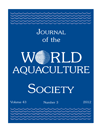
JOURNAL OF THE WORLD AQUACULTURE SOCIETY
Championing Sustainable Practices in Aquatic SciencesThe JOURNAL OF THE WORLD AQUACULTURE SOCIETY, published by WILEY, serves as a premier platform for researchers, practitioners, and academics in the thriving fields of aquaculture and aquatic sciences. With an ISSN of 0893-8849 and an E-ISSN of 1749-7345, this esteemed journal boasts an impressive ranking in Scopus, placing it in the Q1 quartile for both Agronomy and Crop Science and Aquatic Science. Recognized for its rigorous peer-review process and high-quality publications since its inception in 1986, the journal continues to play a vital role in disseminating cutting-edge research that addresses the complex challenges and opportunities within aquaculture practices globally. The journal's impact is underscored by its rank of #37 out of 247 within the category of Aquatic Science and #70 out of 406 in Agronomy in 2023, positioning it firmly in the top tier of scholarly journals. Researchers and professionals will find an invaluable resource in this journal, which not only aims to advance scientific knowledge but also fosters a community committed to sustainable aquatic development.

Water Biology and Security
Pioneering interdisciplinary insights in water biology.Water Biology and Security, published by KEAI PUBLISHING LTD, is a pivotal open-access journal that has been addressing critical issues in the interdisciplinary fields of water sciences, aquatic biology, and environmental sustainability since its inception in 2022. With an E-ISSN of 2772-7351 and a distinguished ranking within the top quartile (Q1) of several categories including Agricultural and Biological Sciences, Animal Science and Zoology, Aquatic Science, and Water Science and Technology, the journal stands out as a leading platform for innovative research. Based in Beijing, China, and supported by an impressive impact factor derived from its Scopus rankings, the journal aims to disseminate high-quality and impactful research that addresses the challenges related to water resources and ecosystems. Its open-access format enhances accessibility, ensuring that vital information reaches policymakers, practitioners, and scholars worldwide. As we converge through 2024, the journal aspires to foster a vibrant scholarly community, facilitating dialogues that inform practice and advance the scientific understanding of aquatic environments.
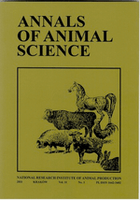
Annals of Animal Science
Cultivating a Global Community of Animal ScientistsAnnals of Animal Science is a prestigious academic journal, published by Walter de Gruyter GmbH in Germany, specializing in the multifaceted field of Animal Science. With an ISSN of 1642-3402 and an E-ISSN of 2300-8733, this journal is recognized for its high-impact contributions, holding a commendable impact factor that demonstrates its relevance in nurturing quality research. The journal has garnered Q2 rankings in 2023 across various categories including Animal Science and Zoology, Food Animals, and Small Animals. Notably, its Scopus Rankings indicate an elite standing, with the journal placing in the top 10% within its specific fields. Covering converged years from 2008 to 2024, the Annals of Animal Science serves as an essential platform for researchers, professionals, and students to disseminate knowledge and advance studies related to animal health, welfare, and production. The journal also emphasizes open access, promoting broader accessibility to foster collaboration and innovation in Animal Science globally. For those committed to advancing their understanding of veterinary and agricultural sciences, this journal is a vital resource.
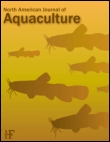
NORTH AMERICAN JOURNAL OF AQUACULTURE
Advancing sustainable aquaculture practices across North America.North American Journal of Aquaculture, published by Wiley, is a premier resource in the field of aquatic science, dedicated to advancing knowledge and research in aquaculture practices across North America. With an ISSN of 1522-2055 and E-ISSN of 1548-8454, this journal serves as an essential platform for researchers, industry professionals, and students focusing on sustainable practices, species cultivation, and aquatic ecosystems. Notably, it ranks in the Q3 category in Aquatic Science according to the 2023 metrics, and stands at the 135th position out of 247 in the Scopus rankings for Agricultural and Biological Sciences—Aquatic Science, reflecting its contribution to the field. As the journal continues to evolve through its converged coverage from 1999 to 2024, it remains committed to disseminating impactful research while providing open access options to facilitate broad readership and engagement. The North American Journal of Aquaculture aims to inspire innovative solutions for the aquaculture sector while fostering a collaborative environment for aquatic science research.

CZECH JOURNAL OF ANIMAL SCIENCE
Bridging Theory and Practice in ZoologyThe Czech Journal of Animal Science, published by the Czech Academy Agricultural Sciences, is a premier open-access journal dedicated to advancing research in the fields of animal science and zoology. With an impressive ranking of Q2 in its category for 2023, it underscores its significance within the academic community, evidenced by its Scopus rank of #197 out of 490 in Animal Science and Zoology, placing it in the 59th percentile among peers. The journal has been a crucial platform for scholarly communication since its inception and has embraced open access since 2004, ensuring that research is widely available to a global audience. Targeted toward researchers, professionals, and students, the journal publishes high-quality original research, review articles, and case studies that contribute to the understanding and enhancement of animal science practices. Its commitment to rigorous peer review and its broad scope undoubtedly solidify its role as an essential resource for those engaged in animal research and agriculture, fostering continued innovation and knowledge transfer in this vital sector.

Animals
Exploring the frontiers of animal biology and welfare.Animals is an esteemed open-access journal published by MDPI, focusing on the dynamic fields of Animal Science and Zoology, as well as Veterinary Sciences. Established in 2011, it has quickly garnered a prominent reputation, achieving Q1 rankings in both Animal Science and Veterinary (Miscellaneous) categories in 2023. With an impressive Scopus ranking placing it in the top 15% of Veterinary journals and the top 13% in Animal Science, Animals serves as a vital platform for researchers and professionals to disseminate and share innovative studies that advance knowledge in animal biology, husbandry, welfare, and veterinary care. By promoting open access since its inception, the journal ensures unrestricted availability of cutting-edge research to a global audience, fostering collaboration and inspiring further studies in the field. Located in the heart of Switzerland, at St. Alban-Anlage 66, Basel, Animals is essential for anyone dedicated to understanding and enhancing the welfare and management of animals across various disciplines.
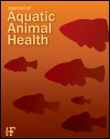
JOURNAL OF AQUATIC ANIMAL HEALTH
Connecting researchers for a healthier aquatic future.JOURNAL OF AQUATIC ANIMAL HEALTH, published by Wiley, is a premier scholarly journal dedicated to advancing the field of aquatic animal health. With an ISSN of 0899-7659 and an E-ISSN of 1548-8667, this journal has established itself as a key resource for researchers, professionals, and students involved in aquatic sciences since its inception in 1989. Covering a comprehensive range of topics within aquatic animal health, the journal aims to disseminate significant findings and foster multidisciplinary collaborations. As of 2023, it is ranked in the third quartile (Q3) within the broader category of Aquatic Science, according to Scopus, reflecting its growing influence in the field. Operating without an open access model, the journal maintains stringent standards for publication, ensuring that it remains a respected platform for high-quality research. Located in Hoboken, NJ, the journal is poised to continue contributing vital insights that enhance the understanding and management of aquatic animal health worldwide.